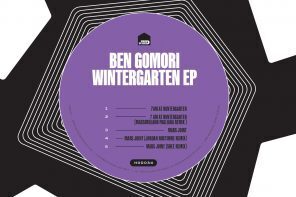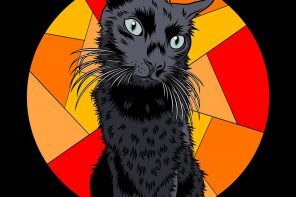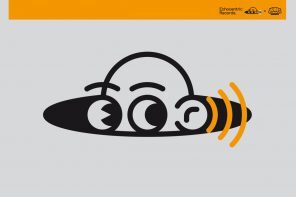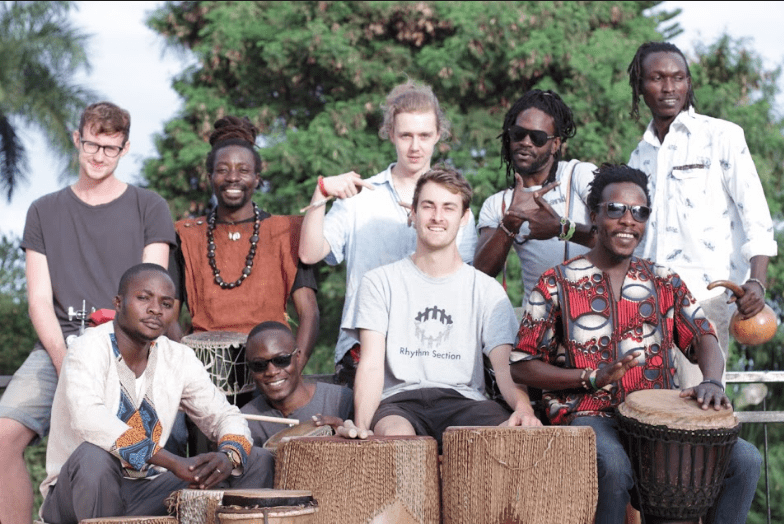
Kawuku Sound is the coming together of UK producers Contours & Cervo and Ugandan percussion troupe Fonkodelis Arkestra. This is the culmination of a month-long creative process that was born out of the Nyege Nyege affiliated Boutiq Studio in Kawuku, Kampala, Uganda. Ahead of their Ugandan release, we spoke to Tom Burford aka Contours about the reasons behind the project, jerk rice and the cultural appropriation debate, his top picks for Uganda and why Manchester is the place to be (outside of Uganda of course). We are also bringing you the premiere of the A4 track on the record “Lost in Sound”.
[soundcloud url=”https://soundcloud.com/boltingbits/premiere-kawuku-sound-lost-in-sound” /]
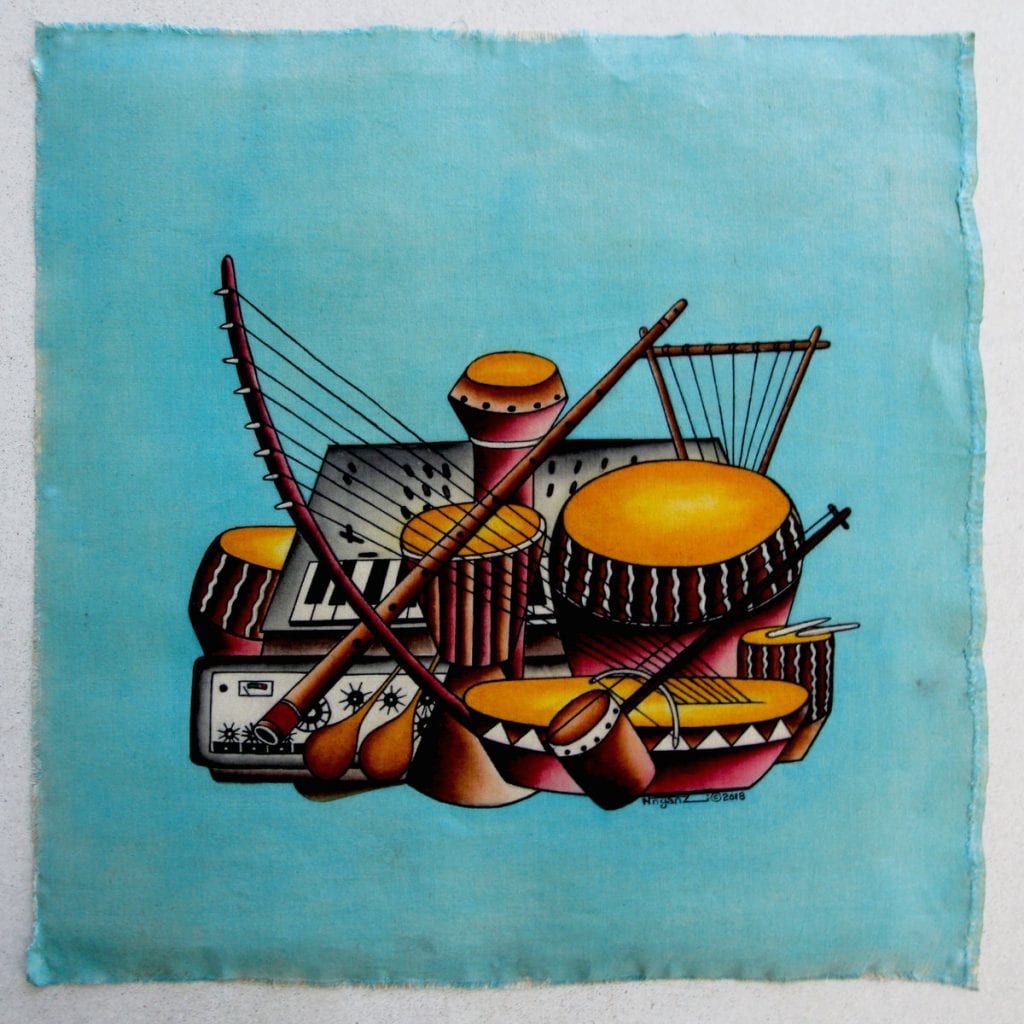
INTERVIEW
What brought you to Uganda? Why Uganda?
I grew up playing drums and having a real interest in percussion. My Dad, who is also a drummer, would listen to a lot of African music when I was younger, as well as Jazz and prog stuff, and I think this interest in percussion has just developed over the years to a point where there was a real desire to delve a bit deeper into elements of that culture.
I’d heard about the work of Santuri Safari in Kenya and Nyege Nyege in Uganda through Tom Blip and was really interested to find out more about what they were doing. There is a much greater exposure of West African music in Europe through the popularity of genres like Highlife and Afrobeat, so I was really keen to find out more about the specific styles emerging out of East Africa.
You were in Uganda for 4 months, what did you learn about the country in that time?
We were luckily enough to be part of a really vibrant arts community in Kampala that centered around the Nyege affiliated residency space we lived in in Kawuku. The community was made up of people from Uganda, DRC, Kenya, Somalia, Ghana, Holland and the UK. We were exposed to a huge confluence of different musical styles, many of which I was completely ignorant of before spending time there.
Uganda is incredibly diverse with 56 tribes making up the country. As a result, the diversity in language and music is huge. Two of the people we lived with, Otim Alpha and Leo Palayeng Kenna were from Gulu in Northern Uganda. They produced a style of music called Electro Acholi, merging traditional Acholi wedding songs, using adungu (Ugandan Harp) with elements of electronic production. Other friends we lived with produced completely different sounds, such as the hybrid of Congolese Soukous and Techno produced by Rey Sapienz. It was this melting pot of different influences and cultures that makes Uganda an endlessly interesting and beautiful place to spend time.
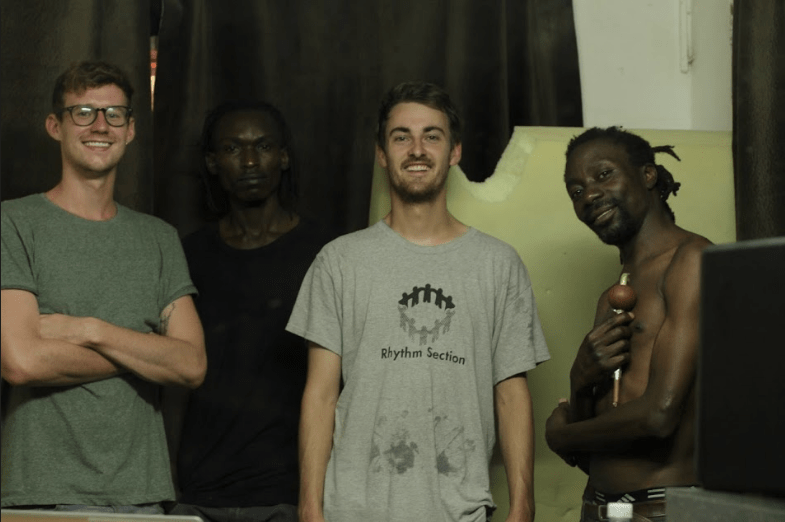
Jamie Oliver sparked intense debate about cultural appropriation, and it is a hot topic right now. As two British white men travelling to an African country as part of a cultural voyage – How do you feel about Jerk Rice and the whole cultural appropriation debate? Where do we draw the line?
Given the nature of this project, being considerate of where the boundaries between appreciation and appropriation lie, and being aware of our privilege, was always something at the forefront of our process. This disparity is something highlighted by the very fact that whilst we had the opportunity to go and record and perform in Uganda, Leo Palayeng Kenna who performed on the record with us, was recently denied a visa to perform in the UK at all, despite having all the relevant invitations in place.
We were really keen for this to be a genuine cultural exchange, as opposed to a sampling project, where we came in, sampled the instrumentation we wanted to give our music a particular sound and then left. The purpose was that we were keen to learn from each other’s approaches to music writing, percussion and production techniques, and create something entirely new in the process, that would be a valuable experience for everyone. The vast majority of the percussion parts were developed over a series of sessions between myself, Fonkdi, who led the Arkestra and the other percussionists throwing ideas into the pot and bring their own vibe.
I think cultural appropriation emerges out of lack of consideration for a culture, and a desire to utilize that culture for your own personal benefit, without giving back in any capacity, and without a genuine interaction and involvement of the culture being referenced.
The important thing in the creation of this record was that everyone involved felt as though their sound has been channeled and reflected in a way they wanted, whilst also bringing together such disparate sounds and influences. The result is something that none of us could have made without the other, and that was always the intention.
Some quotes from some of the artists we worked with:
Alfred Fonkdi:
“it was a great time last September doing this.
And for us it is the first professionally recorded percussion sounds
And now we got good work in our hands to show our fans”
Leo Palayeng Kenna:
“Man, that is a great piece of work, real magic on the adungu and all the sounds”
Spyda MC:
“its really amazing, these magical mystical sounds”
As well as the creation of the album itself, we spent quite a bit of our time out there running music production workshops, something I was lucky enough to be able to do in Kenya and Tanzania as well. This was one of the many ways we were able to reciprocate the learning experience, sharing knowledge as well as gaining it.
Top 5 meals you had in Uganda?
Number one, purely for the amount of times I ate it, has to without a doubt be the fabled Rolex! A delicious omlette with shredded cabbage, onion and tomato, wrapped in a hot greasy chapati. You can get this at any time of the night in Kampala, and for 1500 shillings!
Our housemate Sapiens (Congo Techno producer) made us some serious Congolese, Ugandan fusion food. My favourite had to be aubergine stew in G nut sauce. Bunga market boasted the best G nut sauce ever. This stuff puts our own peanut butter to shame!
Fried tilapia, chips, avocado and kachumbari. This was honestly some of the best fish and chips I’ve ever had! Done best down at one of the spots in Ggaba Beach!
Fish and Casava leaf stew with Ugali was another top Boutiq studio dish.
Kikomando – A dish made from chopped up chapati pieces and kidney bean stew. This with some avocado on top and you are winning!
Gonna throw in a sixth, just because I couldn’t leave it out. Ibex Ethiopian restaurant in Kapalagala. Best Injira and Ethiopian dishes I’ve ever had.
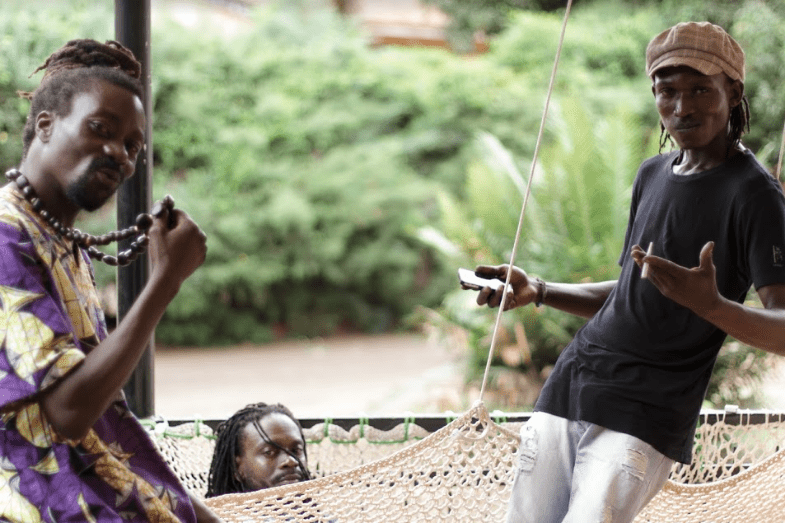
Ethical tourism is another ‘thing’ right now – Khazakstan, Senegal, Georgia – have all become places to go. What do you think about ethical tourism?
I think it is a positive thing if tourists make a conscious decision to engage with a place on an ethical level. A lot of tourist destinations all over the world, particularly those in less affluent countries, are completely cut off from the reality of place. Tourist resorts allow people to live in a very isolated bubble, whilst completely disregarding anything that makes that culture so unique in the first place. Whilst these resorts may employ locals, they are often run by huge companies with little money really going back into the community.
Ethical tourism that seeks to put back into communities can be of genuine benefit, and I think it is largely about intention. If you are travelling somewhere to engage in voluntary work to enhance your own personal self-worth, and the reality is your work is not actually of any benefit, then the intention is wrong. If you are contributing positively to a place, either through voluntary work that is of genuine benefit and necessity, or through the way you choose to travel in a country that has a positive impact for locals, then that is good. That is certainly better than visiting somewhere, only to live in a luxury apartment surrounded by a 10-foot wall with no interaction with the outside world.
Top 5 things to do in Uganda?
Nyege Nyege festival.
Go check out Fort Portal’s beautiful lakes and spectacular scenery.
A Boda Boda ride through central Kampala whilst trying desperately to cling onto a long Engalabi drum.
Get a boat out onto Lake Victoria and check out one of the beautiful peninsulas and islands surrounding Kampala.
Wonder through the manic, tight and spice infused alcoves of Owino Market.
With the advent of the internet we now have music at our fingertips. African music and world music have been allowed to flourish, as now we can listen to rare grooves, previously obscure musics and our fave Drake numbers all at the click of the button. Take Steve Monite’s Nigerian disco classic – Only You, which is pushing a million views. Who are your top 5 African or World Music musicians?
This is really hard to narrow down to only 5, but I would say my top 5 musicians from Africa at the moment would have to be…
Maalem Mahmoud Guinia:
The late Guinia who sadly passed away in 2015 is one of the most respected musicians from Morocco’s Gnawa culture. His own music driving and trance inducing music coupled with his inimitable vocals are incredible. He has also gone on to collaborate with incredible musicians from Pharoah Sanders to Floating Points.
Spirits Rejoice:
This incredible South African Jazz fusion group wrote some absolutely mind-blowing music in the 70’s that has definitely in some part paved the way for the sound exploding on London’s current jazz circuit.
Nakibembe Xylophone Group:
I was lucky enough to see this group perform at Nyege Nyege in 2017 and was blown away by the intricacies of their playing. It’s so easy to get completely swept away in the rolling polyrhythms and chants of Nakibembe. There’s not loads of material surrounding them online but a few videos on youtube that give an insight into their music. The magic of this music though is undoubtedly in catching in live, as the group dig a huge hole in the group to act as the xylophone’s resonant chamber. It’s incredible stuff!
Aleke Kanonu:
Seemlessly cutting across elements of Afrobeat, Disco, Funk and Jazz, Aleke Kanonu’s sound merges the vibrancy of Nigerian music and 1970’s NYC. His only album Aleke is seriously hi energy, raw and stunningly beautiful all at once!
Franck Biyong:
Franck is a Cameroonian musician we were lucky enough to jam with a bit at ADA studios in Nairobi and whom I saw perform during my second time in Kenya. He is an incredible guitarist and multi-instrumentalist bridging the gap between Afro, electric and spiritual Jazz sounds in a really unique and interesting way. I couldn’t pigeonhole Franck’s sound but he is definitely worth checking out. The album Ibolo Ini that he released on ADA with Orchestre Lipombe is a perfect place to start.
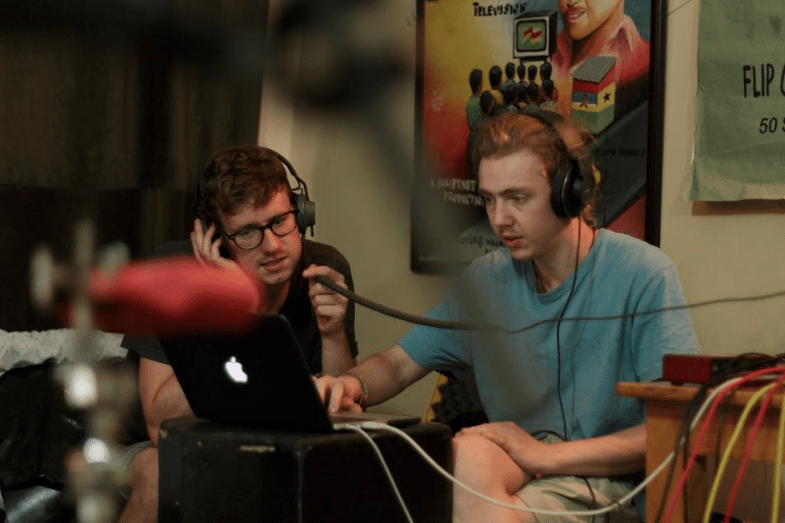
You both have held an NTS residency for ages. Internet radio is growing and growing. Where do you see the future of online music going?
The growth of internet radio has opened us up to a world of music that never previously existed unless you were able to travel thousands of miles to experience it first hand or were willing to shell sometimes exorbitant amounts of money on collector records. With the rise of stations like NTS, Worldwide FM, Reform and Redlight Radio, people have the ability to shun the stale playlists of commercial radio for something far more interesting and unique. I think this has been really positive, both from the perspective of someone who finds a lot of new music through online radio, and also from the perspective of being able to share elements of my record collection and explore musical interests I wouldn’t be able to as easily in a club setting. There’s nothing like sitting down and listening to the radio with a good brew!
Tom, what instruments can you play?
I wouldn’t really consider myself a multi-instrumentalist, more a producer with a background in drums and percussion. I have been experimenting more with tuned percussion recently though, whether Balafon’s, xylophones or Gamelan. I’m starting to build more of synth collection now as well though which is becoming an increasing part of my productions.
You both have adopted Manchester as your home. Why Manchester?
I think Manchester just has a really good combination of things going for it, despite the weather which is pretty bleak a lot of the time. There’s a proper vibrant arts and music scene, genuinely humble and supportive people creating interesting stuff, and a rawness that makes it exciting.
Top 5 things to do in Manchester?
Rice and 3! Go and grab a thali from ‘This and That’ in the Northern Quarter. Amazing Indian food on a budget.
Go check out Partisan collective on Cheetham Hill Road and all the great arts, music and community events they host.
Go check out all the record stores! Best in my opinion being Piccadilly Records, Vinyl Exchange, Eastern Bloc (all within a couple hundred metres of each other), King Bee, Hi-Tackle and All Night Flight (appointment only).
Get to Band On The Wall for one of the many incredible gigs they put on, or for Mr Scruff’s monthly Residency ‘Keep it Unreal’, undeniably one of the foundations of Manchester Club Culture.
Get loose in Salford’s infamous party bunker ‘The White Hotel’.
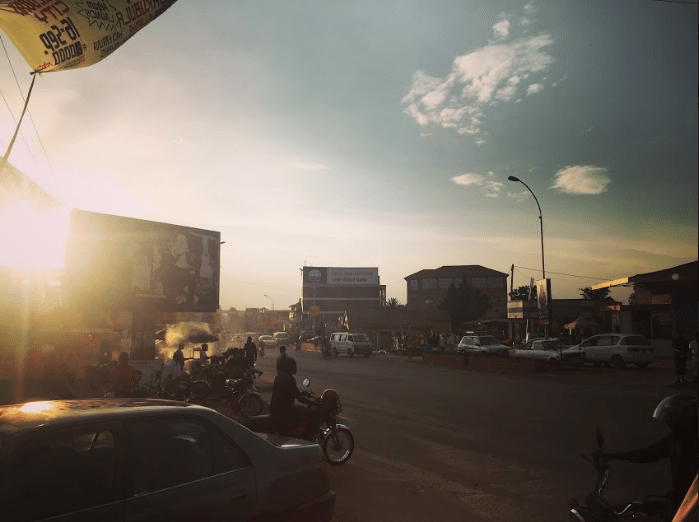
What music inspired you in Uganda? Any artists we should keep an eye on?
I think all of the musicians we encountered in Uganda inspired us in some capacity.
Number one has to be Fonkodelis Arkestra! We saw these guys perform on the last night of Nyege Nyege. It was an acoustic performance underneath the canopy of one of the few sheltered spaces in the festival site, whilst the rain beat it down furiously outside. Their energy was infectious and their playing unlike any other percussion troupe we had seen before. It was a moment of being completely lost in the music!
Although I’ve already mentioned them, Nakibembe Xylophone group brought out the polyrhythmic face melters. Never seen anything like it before or since!
Keep an eye on Slick Back. We lived with this guy in Kampala and he is making some serious sounds at the moment. A hybrid of instrumental grime, techno and general rhythmic madness. He is redefining the sounds people would naturally associate with East Africa but doing it in his own unique way.
Rey Sapienz (also already mentioned for his cooking prowess) is another artist making interesting music in Uganda at the moment. He is channeling the music of his upbringing in Congo, Soukous, with his love for techno. His sound is just one of the many pieces making up the jigsaw of Kampala’s contemporary electronic music scene.
Nilotica Cultural Ensemble are a traditional Ugandan percussion troupe as well as a professional group of tailors, led by Jajja Kalandalugo, who channel the sound and culture of Buganda drumming. From this also formed Nihiloxica, a group formed between Nilotica cultural ensemble and fellow UK producers and friends Spooky J and PQ.
As well as all these live acts you should also keep an eye out for these DJ’s. Hibotep is a Somali born, Ethiopia raised and Kampala based DJ whose sound is fiercely independent in her sound!
Fya LeBoof is a Kampala based DJ whose sound moves from soukous, afro house, latin, samba and techno to general upfront percussive heat. Fya also helps curate the Kalabash night in Kampala where I was able to catch her play. She has a real energy behind the decks!
Kampire has been making waves across Europe this last summer having played a string of big festivals dates. We caught her absolutely lay it down at Nyege Nyege last year playing everything from afro-house and techno to kuduro.
Sameed

